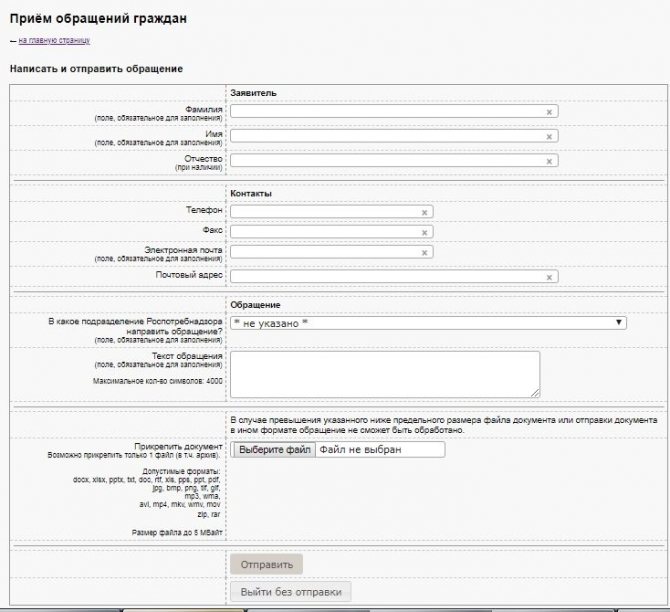When faced with facts of violation of interests and rights by government organizations, legal entities, individual entrepreneurs, and other citizens, citizens can send an electronic complaint to the violator and demand elimination of the violation itself and its consequences in accordance with the current legislation of the Russian Federation. This is one of the convenient ways to protect your rights, since you don’t have to waste time traveling to different organizations, but send a document without leaving your home. Despite the fact that claims are sent on completely different issues and to different structures, certain principles for drafting the document should be adhered to. A competent approach when filing a claim allows you not only to solve a specific problem and prevent the emergence of new, similar offenses.
Where to complain
First of all, you need to decide on the addressee. This could be the head of a department or organization, a supervisory authority, a municipality, etc. A competent choice of addressee directly affects the speed and quality of consideration of the issue. For example, to begin with, it is enough to complain about a cashier to the manager of a retail outlet and there is no need to immediately contact the director of the shopping center.
In general, when choosing where to send a complaint, it is recommended to be guided by the so-called priority principle. At the first stage, citizens are obliged to complain directly to the perpetrator of the offense or his leadership. This step is considered as an attempt to resolve the problem pre-trial and is a mandatory step for the subsequent filing of a claim in court, if such a need arises. Without this step, higher authorities or supervisory authorities may also not accept claims from the injured party (except for violations related to a threat to human health or life).
An incorrect choice of addressee automatically increases the period for its consideration while the document is forwarded between authorities. Before complaining, it is important to make sure that the problem falls within the competence of the selected addressee.
First of all, you can file a claim to:
- seller (when purchasing goods of inadequate quality);
- head of department, organization;
- management company, housing inspection (on the provision of housing and communal services);
- an individual entrepreneur or company engaged in the provision of services under a contract;
- public authorities;
- Rospotrebnadzor (in case of violation of consumer rights regarding the quality of goods and services);
- public associations.
Leave a comment on the document
Do you think the document is incorrect? Leave a comment and we will correct the shortcomings. Without a comment, the rating will not be taken into account!
Thank you, your rating has been taken into account. The quality of documents will increase from your activity.
| Here you can leave a comment on the document “Sample. Complaint about unlawful actions of an official (government body)”, and ask questions associated with it. If you would like to leave a comment with a rating , then you need to rate the document at the top of the page Reply for |
General recommendations
Russian legislation has not established a single standard for electronic, or any other, complaints. But regardless of the addressee, there are a number of generally accepted requirements that should be followed when drawing up a document:
- Mandatory indication of the author's real data (full name, phone number, e-mail, postal address), which may be needed to clarify additional details. It is important to know that anonymous complaints will not be considered.
- Using only reliable facts about yourself and the current problem (addresses, numbers, dates, etc.). If false information is provided, the author may be held accountable.
- Maximum objectivity of the text without expression of personal emotions and grievances.
- Business language of presentation in compliance with the rules of grammar and syntax. The problem should be described concisely, focusing on the most significant facts in chronological order. Expressions with a figurative or double meaning should not be used.
- Presentation of only verified facts and their support with appropriate arguments and evidence.
- Argumentation of your own requirements based on the norms of current legislation and available evidence.
- Absence of obscene, slang, offensive expressions, or threats addressed to anyone. Otherwise, the appeal simply will not be considered, and its author may be deprived of the right to pre-trial settlement of the issue.
Before sending an email, it is important to check the stability of your Internet connection. If the speed is slow or the signal disappears, errors may occur during the document sending process.
Citizens of the Russian Federation, on the basis of current legislation, have the right to contact government bodies with statements, appeals, proposals, complaints, and by sending an appeal by postal mail and to the official addresses of government bodies. Representatives of legal entities and citizens' associations also have the right to contact government bodies. The main federal laws regulating the appeal of citizens:
- Federal Law “On the procedure for considering appeals from citizens of the Russian Federation”;
- Federal Law “On the organization of the provision of state and municipal services”;
- Federal Law “On Ensuring Access to Information on the Activities of State Bodies and Local Self-Government Bodies.”
These are not all legislative acts that specify the requirements for considering appeals. There are rules of law that establish specifics in the consideration of Deputy requests, media requests, etc. In this article we will not touch on them, but will consider the general requirements and features. I would like to note that in addition to those specified by federal law, there is Resolution of the Government of the Russian Federation dated August 16, 2012 N 840 Moscow “On the procedure for filing and consideration of complaints against decisions and actions (inaction) of federal executive authorities and their officials, federal state employees, officials of state extra-budgetary funds of the Russian Federation” I will tell you about the features of this legislative document below. What features does the name of the declared document bear:
- A proposal is a citizen’s proposal aimed at improving the work of a government agency or improving the consideration of any issue related to the provision of public services;
- A statement is a request from a citizen or organization for help in realizing their rights, or criticism of a government body;
- A complaint is a request for the protection of violated rights associated with illegal actions against a person or inaction of an official or government body.
IT IS IMPORTANT TO KNOW! The law prohibits persecution of a person due to this application to a government body with a statement, proposal, or complaint. This is the most important difference, for example, from an application for criminal prosecution, where a person can be prosecuted for knowingly false denunciation.
In addition, when a citizen applies, it is prohibited to disclose information contained in the application, as well as affecting the private life of the applicant, without his written consent. However, the redirection of information and appeals to another state executive or legislative body whose competence includes consideration of a particular issue specified in the appeal is not considered disclosure. What should an application sent on the basis of the above legislative acts contain:
- Addressee – the name of the official or government agency;
- Applicant – full name, address to which a response must be given;
- The descriptive part of the appeal, complaints, claims, suggestions;
- Necessary documents - this is the case if you want to attach documents that additionally indicate that you are right.
INTERESTING FACT! The Federal Law “On the Procedure for Considering Appeals from Citizens of the Russian Federation” does not require a signature to indicate the date, but some authorities require the specified details. At the same time, if you did not sign and date, but were refused consideration, you can appeal this unlawful action of the government body. When citizens apply, some government officials forget that if they send an application via the application form, they do not indicate a signature, but they still respond to such requests.
When applying in person, you must have a passport and describe the essence of the application. If desired, additional documents are provided, which will be attached to the application, and subsequently sent for consideration to the appropriate official. There is a general deadline for registering an appeal when it is received by a government agency or official whose official powers include consideration of this issue - this is a period of 3 days from the date of receipt. Sometimes, a citizen appeals to the wrong body or to the wrong official, or in cases where consideration of the issues raised in the appeal falls within the competence of several executive bodies or officials, then the appeal within 7 days after registration is sent to the body in whose authority includes consideration of the issue. In cases where the appeal falls within the competence of several bodies, a copy of the appeal is sent within the above period to all bodies or all officials whose competence includes consideration of the issues specified in the appeal.
REMEMBER! As established by law, it is prohibited to send a complaint to the body or official whose actions (inactions) are being appealed. According to this fact, right and left there is a violation on the part of the authorities to the Prosecutor's Office when they send a complaint sent to them to the body whose actions (inactions) are being appealed.
Employees of the Prosecutor's Office illegally refer to an internal order of the Prosecutor General's Office, which states that employees of the Prosecutor's Office are obliged to forward the complaint to the body whose actions are being appealed, if the arguments set out in the complaint were not previously considered by this body. This also violates the instructions of the Prosecutor's Office for considering citizens' appeals, which also establishes a ban on forwarding a complaint to the official or body whose actions (inactions) are being appealed. Deadlines for consideration of applications:
- 3 days to register an appeal;
- 30 days to consider the appeal, in exceptional cases, consideration of the appeal can be extended to 30 days, but the said extension must be signed by the head of the body to which the appeal was sent, indicating the objective reasons;
- There are peculiarities in the consideration of complaints, as established by Decree of the Government of the Russian Federation N 840, the period for consideration of complaints against the actions (inactions) of an official or against the actions or inactions of a government body must be considered within 15 days after registration.
- A specialized law establishing the consideration of specific issues of law may establish shorter deadlines for the consideration of requests and complaints.
Experienced lawyers of the Regional Center for Legal Security will correctly formulate an appeal, complaint to a government body or official, or file an administrative claim. In what order are the actions of the lawyers of the Regional Center for Legal Security carried out:
- They will analyze your situation and evaluate the possibility of appealing against certain actions (inactions) of an official or government body;
- They will prepare an application or complaint to a government agency and correctly state the requirements that need to be considered in the said complaint;
- If necessary, they will prepare an appeal to a higher authority or to the bodies of the Prosecutor's Office of the Russian Federation;
- They will file an administrative claim against the actions or inactions of an official, and assistance in filing an administrative claim;
- They will represent your interests in an administrative claim in a court of general jurisdiction, and in cases where the consideration of a dispute is within the jurisdiction of the Arbitration Court, they will represent your interests in the Arbitration Court;
- After satisfying your requirements in court, we will represent your interests at the stage of execution of the court decision.
Complaint structure
For a complaint submitted via email, the structure will be similar to the postal or personal filing options. The document can be compiled in free form using a text editor on a computer. The registration procedure will be as follows:
- Indicate in the upper right corner the addressee (official/name of organization, address) and personal information of the author (full name, place of residence, phone number, e-mail).
- Write the title of the document “Complaint about...” in the center below.
- Describe the problem situation, indicating the characters, date and place of events.
- Indicate the detected violations, if possible supporting them with references to the relevant legal provisions.
- State your requirements.
- Indicate (if available) a list of additional materials (copies of documents, photographs) that will be attached to the appeal as evidence of the author’s correctness.
- Indicate the date the document was compiled and the full name of the author. For some situations, you will need to certify the document with a personal electronic signature.
Sample complaint
The completed document should be sent by email to the structure whose services or activities are subject to appeal.
There is another way to file a complaint:
- electronic official resource of the government body that provided the public service through the use of the Internet;
- through the website of the state Unified portal of municipal and state services.
If a complaint about the inaction of executive authorities is submitted electronically, the applicant must use an electronic signature, its type is approved by the laws of Russia. If it is necessary to provide other documents as evidence, they should also be submitted electronically. In this case, you do not need to send a scan of your passport.
Complaints about the inaction of executive authorities are considered by the government body whose employee’s actions are being complained about; if we are talking about the head of the body that provided the public service, then the complaint should go to a higher authority. In the absence of one, the complaint is submitted directly to the head of the government agency. If the complaint is not within the scope of activity of the state body, then within three days it must be transferred to the appropriate structure and the applicant must be informed about this.
Contacting the Internet reception
Unlike electronic complaints via e-mail, special forms are provided for requests via Internet reception desks or specialized portals. The citizen can only fill in the fields with the relevant information. Some services allow you to send letters without the need for prior registration. But by registering, a citizen has the opportunity to track changes in status and the progress of the consideration of the issue. In addition, some requests to government agencies, which may serve as a basis for checking the violator, will require mandatory authorization through the Unified Identification and Logistics Authority.
The portals operate around the clock, so citizens can post a complaint at a convenient time, regardless of their location.
To complain, you need to go to the official website of the institution and select the appropriate section (Write a complaint, Electronic reception, etc.). The forms will differ depending on the recipient, but the following fields remain common (all required fields are marked with an “*”):
- topic of appeal;
- author's data (full name, place of residence, e-mail, postal address);
- essence of the problem;
- preferred form of response: email or postal mail;
- additional attachments (photographs, documents) to confirm the arguments presented.
In electronic forms there are restrictions on the amount of text (often up to 2000-4000 characters). If the standard volume is not enough, the remaining information can be stated in an attached document or sent by mail.

Procedure and terms of consideration
All incoming requests, including electronic complaints, are subject to mandatory registration as incoming correspondence within three days. Next, the document undergoes a preliminary review, after which it is sent to an official or other authority within whose competence the stated problem falls.
The maximum waiting time for a response established by law depends on the following reasons:
- 10 days – for situations related to the provisions of the Law “On Protection of Consumer Rights”;
- 30 days – when applying to state authorities or local government.
In certain authorities (for example, the Prosecutor's Office), for complaints that do not require additional checks, the response period is reduced to 15 days. On the contrary, if additional measures are necessary, the time interval is increased by another 30 days. In this case, the author must be notified of the decision made, the reasons and the planned time frame for consideration of the issue.
If there is no response within the specified time frame, the reason for this may be:
- lack of personal data, without which it was impossible to contact the author;
- use of profanity or threats in the text;
- a requirement to resolve a situation for which the author was previously provided with an answer;
- inability to determine the essence of the problem due to unclear presentation of the text or other reasons;
- software failure or other factors due to which the email did not reach the recipient.
The response to the author can be sent in the form of an electronic document by email or postal mail, which indicates proposals for resolving the dispute and the time frame for their implementation. When refusing to resolve a problem, valid reasons must be indicated.
If the result of consideration of the appeal is unsatisfactory or it remains unanswered, you should contact higher authorities or government agencies that control the activities of the violator. In addition, citizens have the right to complain to the prosecutor's office, police or court.
In conclusion
Civil servants are obliged to fully comply with all requirements of the law and not to violate the Code of Ethics of Official Conduct. However, in life, officials sometimes act not for the benefit of the people, but for the benefit of themselves. In order for civil servants to act for the good of the country, people must monitor their activities and immediately report violations committed by them. A complaint against the actions of a civil servant is one of the measures that leads to control over the actions of the state. employee.
Did not find an answer to your question? Ask it to a lawyer by phone!
. Moscow: +7 (499) 110-89-42
St. Petersburg: +7 (812) 385-56-34
- About
- Latest Posts
Consultant VSude.INFO
Legal consultant of the site VSude.INFO Ask your questions in the comments or in the feedback form. Verification and response time is from 24 to 48 hours.










